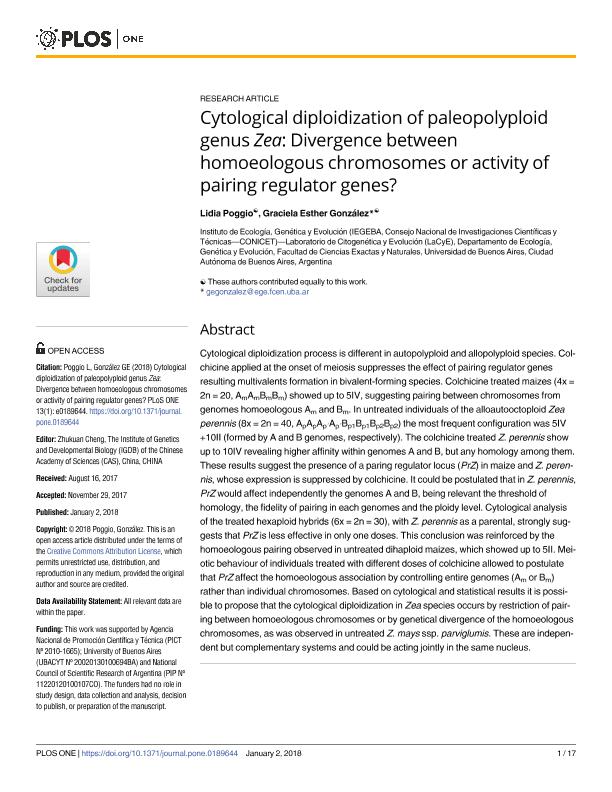Mostrar el registro sencillo del ítem
dc.contributor.author
Poggio, Lidia

dc.contributor.author
González, Graciela Esther

dc.date.available
2019-11-21T15:01:38Z
dc.date.issued
2018-01
dc.identifier.citation
Poggio, Lidia; González, Graciela Esther; Cytological diploidization of paleopolyploid genus Zea: Divergence between homoeologous chromosomes or activity of pairing regulator genes?; Public Library of Science; Plos One; 13; 1; 1-2018; 1-17
dc.identifier.issn
1932-6203
dc.identifier.uri
http://hdl.handle.net/11336/89385
dc.description.abstract
Cytological diploidization process is different in autopolyploid and allopolyploid species. Colchicine applied at the onset of meiosis suppresses the effect of pairing regulator genes resulting multivalents formation in bivalent-forming species. Colchicine treated maizes (4x = 2n = 20, AmAmBmBm) showed up to 5IV, suggesting pairing between chromosomes from genomes homoeologous Am and Bm. In untreated individuals of the alloautooctoploid Zea perennis (8x = 2n = 40, ApApAp´Ap´Bp1Bp1Bp2Bp2) the most frequent configuration was 5IV +10II (formed by A and B genomes, respectively). The colchicine treated Z. perennis show up to 10IV revealing higher affinity within genomes A and B, but any homology among them. These results suggest the presence of a paring regulator locus (PrZ) in maize and Z. perennis, whose expression is suppressed by colchicine. It could be postulated that in Z. perennis, PrZ would affect independently the genomes A and B, being relevant the threshold of homology, the fidelity of pairing in each genomes and the ploidy level. Cytological analysis of the treated hexaploid hybrids (6x = 2n = 30), with Z. perennis as a parental, strongly suggests that PrZ is less effective in only one doses. This conclusion was reinforced by the homoeologous pairing observed in untreated dihaploid maizes, which showed up to 5II. Meiotic behaviour of individuals treated with different doses of colchicine allowed to postulate that PrZ affect the homoeologous association by controlling entire genomes (Am or Bm) rather than individual chromosomes. Based on cytological and statistical results it is possible to propose that the cytological diploidization in Zea species occurs by restriction of pairing between homoeologous chromosomes or by genetical divergence of the homoeologous chromosomes, as was observed in untreated Z. mays ssp. parviglumis. These are independent but complementary systems and could be acting jointly in the same nucleus.
dc.format
application/pdf
dc.language.iso
eng
dc.publisher
Public Library of Science

dc.rights
info:eu-repo/semantics/openAccess
dc.rights.uri
https://creativecommons.org/licenses/by-nc-sa/2.5/ar/
dc.subject
ZEA
dc.subject
PAIRIN REGULATOR LOCUS
dc.subject
COLCHICINE TREATMENT
dc.subject.classification
Ciencias de las Plantas, Botánica

dc.subject.classification
Ciencias Biológicas

dc.subject.classification
CIENCIAS NATURALES Y EXACTAS

dc.title
Cytological diploidization of paleopolyploid genus Zea: Divergence between homoeologous chromosomes or activity of pairing regulator genes?
dc.type
info:eu-repo/semantics/article
dc.type
info:ar-repo/semantics/artículo
dc.type
info:eu-repo/semantics/publishedVersion
dc.date.updated
2019-10-09T20:44:46Z
dc.journal.volume
13
dc.journal.number
1
dc.journal.pagination
1-17
dc.journal.pais
Estados Unidos

dc.journal.ciudad
San Francisco
dc.description.fil
Fil: Poggio, Lidia. Consejo Nacional de Investigaciones Científicas y Técnicas. Oficina de Coordinación Administrativa Ciudad Universitaria. Instituto de Ecología, Genética y Evolución de Buenos Aires. Universidad de Buenos Aires. Facultad de Ciencias Exactas y Naturales. Instituto de Ecología, Genética y Evolución de Buenos Aires; Argentina
dc.description.fil
Fil: González, Graciela Esther. Consejo Nacional de Investigaciones Científicas y Técnicas. Oficina de Coordinación Administrativa Ciudad Universitaria. Instituto de Ecología, Genética y Evolución de Buenos Aires. Universidad de Buenos Aires. Facultad de Ciencias Exactas y Naturales. Instituto de Ecología, Genética y Evolución de Buenos Aires; Argentina
dc.journal.title
Plos One

dc.relation.alternativeid
info:eu-repo/semantics/altIdentifier/url/https://journals.plos.org/plosone/article?id=10.1371/journal.pone.0189644
dc.relation.alternativeid
info:eu-repo/semantics/altIdentifier/doi/http://dx.doi.org/10.1371/journal.pone.0189644
Archivos asociados
